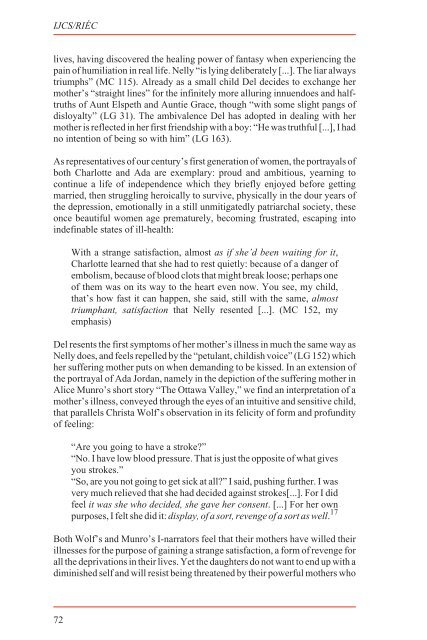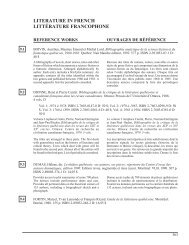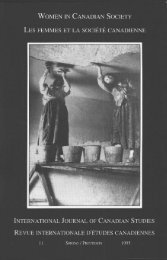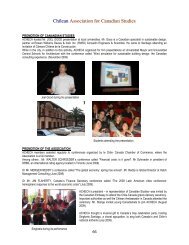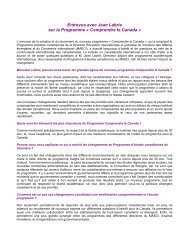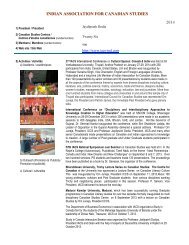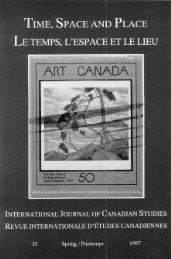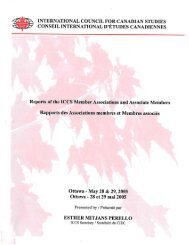Arts and Literature in Canada:Views from Abroad, Les arts et la ...
Arts and Literature in Canada:Views from Abroad, Les arts et la ...
Arts and Literature in Canada:Views from Abroad, Les arts et la ...
- No tags were found...
Create successful ePaper yourself
Turn your PDF publications into a flip-book with our unique Google optimized e-Paper software.
IJCS/RIÉClives, hav<strong>in</strong>g discovered the heal<strong>in</strong>g power of fantasy when experienc<strong>in</strong>g thepa<strong>in</strong> of humiliation <strong>in</strong> real life. Nelly “is ly<strong>in</strong>g deliberately [...]. The liar alwaystriumphs” (MC 115). Already as a small child Del decides to exchange hermother’s “straight l<strong>in</strong>es” for the <strong>in</strong>f<strong>in</strong>itely more allur<strong>in</strong>g <strong>in</strong>nuendoes <strong>and</strong> halftruthsof Aunt Elsp<strong>et</strong>h <strong>and</strong> Auntie Grace, though “with some slight pangs ofdisloyalty” (LG 31). The ambivalence Del has adopted <strong>in</strong> deal<strong>in</strong>g with hermother is reflected <strong>in</strong> her first friendship with a boy: “He was truthful [...], I hadno <strong>in</strong>tention of be<strong>in</strong>g so with him” (LG 163).As representatives of our century’s first generation of women, the portrayals ofboth Charlotte <strong>and</strong> Ada are exemp<strong>la</strong>ry: proud <strong>and</strong> ambitious, yearn<strong>in</strong>g tocont<strong>in</strong>ue a life of <strong>in</strong>dependence which they briefly enjoyed before g<strong>et</strong>t<strong>in</strong>gmarried, then struggl<strong>in</strong>g heroically to survive, physically <strong>in</strong> the dour years ofthe depression, emotionally <strong>in</strong> a still unmitigatedly patriarchal soci<strong>et</strong>y, theseonce beautiful women age prematurely, becom<strong>in</strong>g frustrated, escap<strong>in</strong>g <strong>in</strong>to<strong>in</strong>def<strong>in</strong>able states of ill-health:With a strange satisfaction, almost as if she’d been wait<strong>in</strong>g for it,Charlotte learned that she had to rest qui<strong>et</strong>ly: because of a danger ofembolism, because of blood clots that might break loose; perhaps oneof them was on its way to the heart even now. You see, my child,that’s how fast it can happen, she said, still with the same, almosttriumphant, satisfaction that Nelly resented [...]. (MC 152, myemphasis)Del resents the first symptoms of her mother’s illness <strong>in</strong> much the same way asNelly does, <strong>and</strong> feels repelled by the “p<strong>et</strong>u<strong>la</strong>nt, childish voice” (LG 152) whichher suffer<strong>in</strong>g mother puts on when dem<strong>and</strong><strong>in</strong>g to be kissed. In an extension ofthe portrayal of Ada Jordan, namely <strong>in</strong> the depiction of the suffer<strong>in</strong>g mother <strong>in</strong>Alice Munro’s short story “The Ottawa Valley,” we f<strong>in</strong>d an <strong>in</strong>terpr<strong>et</strong>ation of amother’s illness, conveyed through the eyes of an <strong>in</strong>tuitive <strong>and</strong> sensitive child,that parallels Christa Wolf’s observation <strong>in</strong> its felicity of form <strong>and</strong> profundityof feel<strong>in</strong>g:“Are you go<strong>in</strong>g to have a stroke?”“No. I have low blood pressure. That is just the opposite of what givesyou strokes.”“So, are you not go<strong>in</strong>g to g<strong>et</strong> sick at all?” I said, push<strong>in</strong>g further. I wasvery much relieved that she had decided aga<strong>in</strong>st strokes[...]. For I didfeel it was she who decided, she gave her consent. [...] For her ownpurposes, I felt she did it: disp<strong>la</strong>y, of a sort, revenge of a sort as well. 17Both Wolf’s <strong>and</strong> Munro’s I-narrators feel that their mothers have willed theirillnesses for the purpose of ga<strong>in</strong><strong>in</strong>g a strange satisfaction, a form of revenge forall the deprivations <strong>in</strong> their lives. Y<strong>et</strong> the daughters do not want to end up with adim<strong>in</strong>ished self <strong>and</strong> will resist be<strong>in</strong>g threatened by their powerful mothers who72


